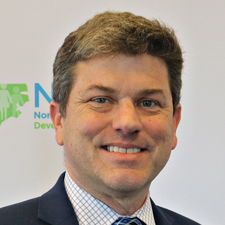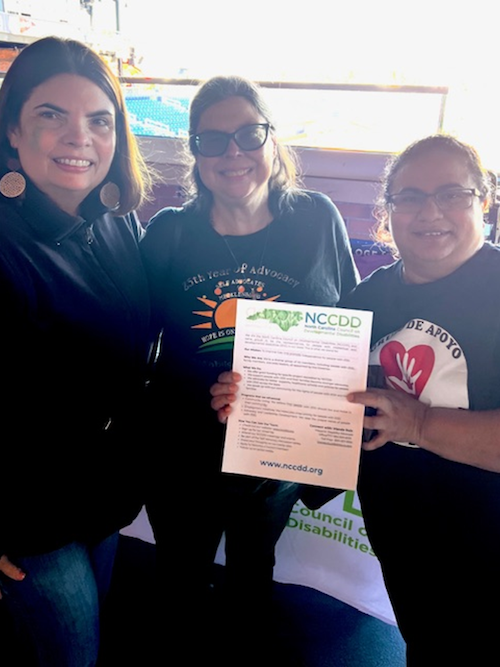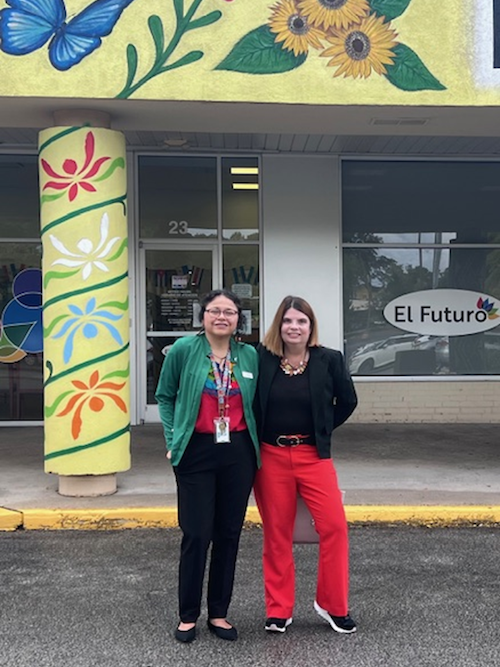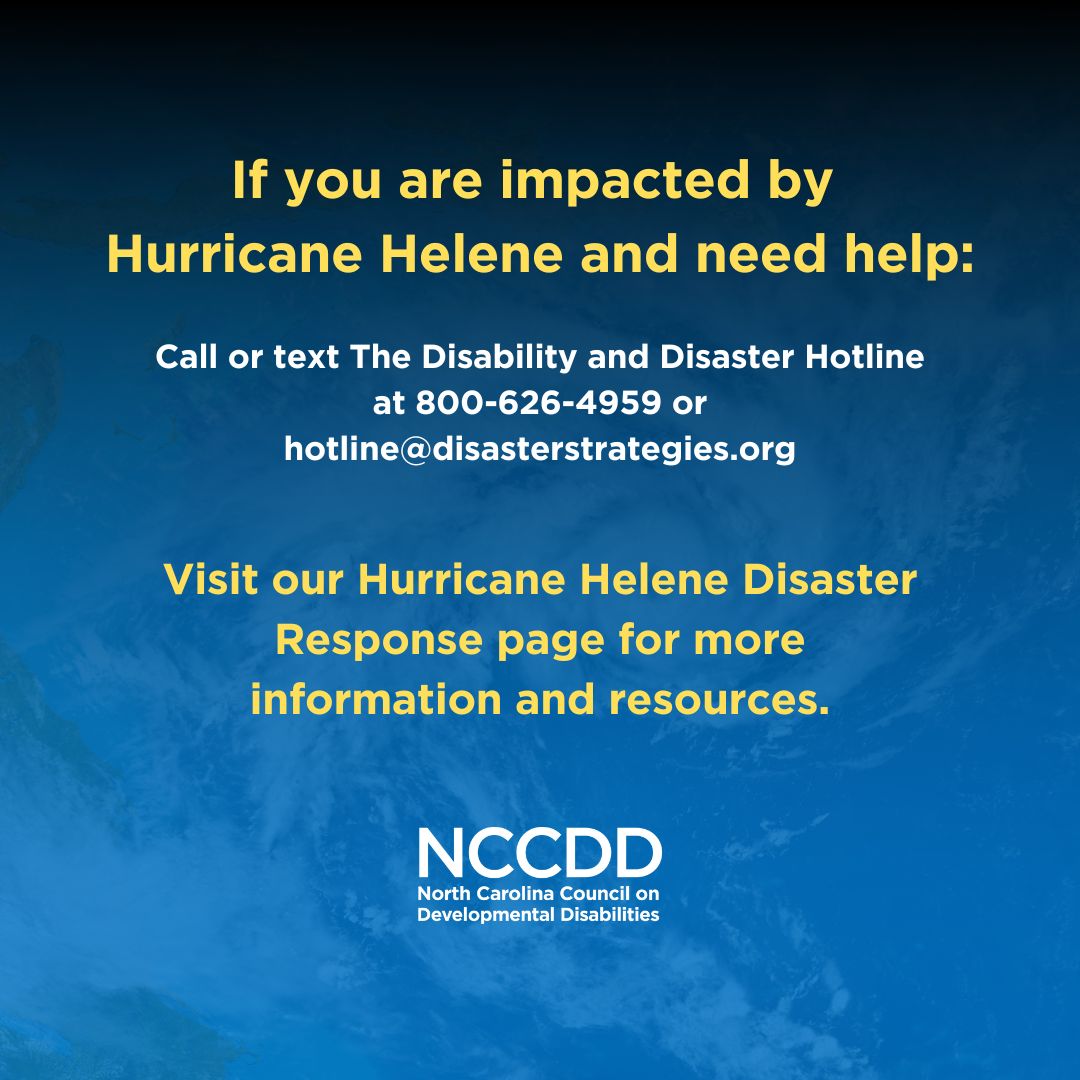October 2024 Highlights and Hot Topics
Message from the Executive Director
 Hurricane Helene has had a devastating impact for many across western North Carolina. This includes many in the intellectual and other developmental disability (I/DD) community. It will take a long time to recover. It will be critical for all of us to continue to find ways to be supportive in the months and years ahead.
Hurricane Helene has had a devastating impact for many across western North Carolina. This includes many in the intellectual and other developmental disability (I/DD) community. It will take a long time to recover. It will be critical for all of us to continue to find ways to be supportive in the months and years ahead.
For those in the disability community who have been impacted, you can call 211 if you need non-emergency help such as food, shelter, clean-up support, and more. If you have internet access, you can find important resources on the following websites: NC DHHS, NC DPS, NCCDD, and DRNC.
Immediately after the storm hit, disability advocates began working with state and federal partners to respond to the crisis. There were daily calls for the first two weeks after the storm and those calls have continued on a regular basis. These calls were used to raise issues, determine what the needs were, and to respond to critical issues. State leaders and LME/MCOs worked together with providers to reach out to all individuals with disabilities who receive services. State leaders and local emergency management also responded to several immediate needs raised on these calls.
There will be many lessons learned from this disaster, but the disability community and leaders are still working hard to respond to it. Over time, we need to hear from people about their experiences during the storm and the ongoing recovery.
We must all work together to ensure people with disabilities who had to leave their homes are able to return to their communities as soon as possible. We must also ensure individuals with disabilities do not end up in nursing facilities and other long-term institutions.
We will all need to work together to recover, rebuild, and support our disability community throughout the western part of the state. Thankfully, we have strong and vocal disability advocates and leaders committed to this work. Let’s not lose our focus as the hurricane recedes from the news. Our western North Carolina disability community needs us, and we need them!
Talley Wells, NCCDD Executive Director
Public Policy Update (as of 10/22/24)
FEDERAL
Budget and Appropriations and Autism CARES Act
Since Congress was not able to come to agreement on a budget for the October 2024 – September 2025 fiscal year budget, Congress passed a three-month long Continuing Resolution (CR) on September 25, 2024 that extends government funding through December 20, 2024 (H.R. 9747). The CR also includes an extension of funding for the Autism CARES Act of 2019, delaying its sunset until December 20, 2024 and teeing up a new vote for the Autism CARES Act of 2024. Congressional members have returned to their home states, and they will return to D.C. after the election.
When they return, work on the budget will resume. This provides an opportunity to advocate to educate your members of Congress on the importance of increasing funding for programs for people with I/DD.
House of Representatives Passes Bill to Improve Access to Home and Community-Based Services for Children in Military Families
On September 23, 2024, the U.S. House of Representatives voted unanimously to pass the Care for Military Kids Act (H.R. 8108), which would ensure children in military families receiving home and community-based services (HCBS) would be able to continue receiving coverage when their families move throughout the country due to a parent’s military service. This bill will need to be passed by the Senate in order to become law.
Think Differently Database Act Passes House Committee on Energy and Commerce
On September 17, 2024, the U.S. House of Representatives Committee on Energy and Commerce passed the Think Differently Database Act (H.R. 670). The bipartisan legislation—sponsored by Representatives Marc Molinaro (R-NY-19) and Mikie Sherrill (D-NJ-11) in the House, and Senators Eric Schmitt (R-MO) and Jon Ossoff (D-GA) in the Senate—would create a comprehensive, national website database of support services and resources for people with disabilities in every state. The next step is for the bill to move to the House for a vote.
Bipartisan Bill to Extend ABLE Provisions Passes Senate
On September 20, 2024, the ENABLE Act (S. 4541) passed the Senate. The bipartisan bill, cosponsored by U.S. Senators Eric Schmitt (R-MO) and Bob Casey (D-PA), would extend provisions improving the Achieving a Better Life Experience (ABLE) Act that will expire in 2025. The ABLE Act enables people with disabilities and their families to save and invest in tax-free savings accounts without losing their eligibility for federal benefits like Medicaid and Supplemental Security Income (SSI). The ENABLE Act would make permanent three key provisions of the ABLE program:
- Enable people with disabilities to be employed and continue to save for the future in their ABLE accounts.
- Enable people with disabilities who are contributing to their ABLE accounts to qualify for a nonrefundable saver’s credit of up to $1,000.
- Enable people with disabilities to transfer some funds from a 529 education savings account to an ABLE account
The ENABLE Act would make sure that people with disabilities can keep their jobs and still save money in their ABLE accounts or save money for college in their ABLE accounts.
Section 14 (c) – Subminimum Wage
With federal officials expected to propose a new rule that could end a government program allowing people with disabilities to be paid less than minimum wage, some lawmakers are already raising red flags.
The U.S. Department of Labor is planning to issue a notice of proposed rulemaking related to Section 14(c) of the Fair Labor Standards Act. The law, which dates back to 1938, allows employers to obtain special certificates from the Labor Department authorizing them to pay people with disabilities less than the federal minimum wage of $7.25 per hour. Disability advocates are expecting the proposed rule to end this program that allows people with disabilities to be paid less than minimum wage. Several states have already banned this practice.
However, some Senators in Congress are asking questions and raising some concerns. Sens. Tom Cotton, R-Ark., and John Boozman, R-Ark., are voicing concern that the agency is “considering a new rule that would abolish the 14(c) program.” They believe that this decision should be up to Congress. The senators are asking the Biden administration to address how many people with disabilities would lose jobs at sheltered workshops under the proposed rule and how the job losses would impact families who may be left to provide daytime care for individuals who are newly unemployed.
This is another area of attention for continuing advocacy and education.
STATE
The legislators returned to Raleigh for sessions in October with the focus on hurricane relief. The House Rules committee convened on October 9, 2024 to discuss a Proposed Conference Committee Substitute (HB149) to address Hurricane Helene relief funding. The bill was titled The Disaster Recovery Act of 2024. This legislation was passed quickly by the Senate and House and signed into law by the Governor.
The bill included $273 million with the largest part of this being for state and local match for federal disaster assistance. (To put this in perspective, the state’s rainy day fund is $4.75 billion. The state also has $733 million in an emergency response and disaster account. So the legislature has $5.5 billion in available funding.) And FEMA is providing additional funds so the state does not have to cover it all. Sen. Berger noted in a press conference that this package is just the first round – more funding will come as we continue to evaluate the extent of the damage and the needs of the communities.
The bill also includes some temporary provisions – such as delaying license renewals for some facilities and flexibilities around where and how services are provided. Flexibilities for schools were enacted in terms of required instruction days and ensuring teachers are paid for missed days. There were also election related changes enacted including modifications on early voting plans and absentee ballot return options.
More specific to I/DD, the Department of Health and Human Services (DHHS) has issued temporary flexibilities including:
- When direct support is not available due to the emergency, relatives may provide Community Living and Supports, Supported Employment and Supported Living;
- People who have temporarily relocated out of state due to the emergency may receive Innovations Waiver services without prior authorization, including respite; and
- NC Medicaid will cover the replacement or repair of homes or vehicle modifications damaged by Hurricane Helene.
NC Medicaid has published a provider bulletin, Hurricane Helene Policy Flexibilities to Support Providers and Members – Oct. 11, 2024, updating flexibilities implemented by NC Medicaid due to the Hurricane Helene Public Health Emergency. The flexibilities in this bulletin are effective from September 26, 2024, through December 31, 2024.
The North Carolina Council on Developmental Disabilities (NCCDD) continues to be deeply focused on the Hurricane Helene disaster. The state is holding daily emergency management calls focused on the disability community. NCCDD has also held additional regular calls focused on the disaster and the disability community.
If you are impacted by Hurricane Helene and need help, call or text The Disability and Disaster Hotline at 800-626-4959 or [email protected].
Update 10-30-24: After this policy update was written, the General Assembly passed an allocation of twenty-five million dollars in non-recurring funds for mental health crisis supports and support for individuals with intellectual and developmental disabilities as part of new funding for hurricane relief.
 At NCCDD, we know that an intellectual or other developmental disability is part of all of our diverse communities. That’s why it’s important to learn about disabilities and know about the services and resources that are available for people with disabilities and their families.
At NCCDD, we know that an intellectual or other developmental disability is part of all of our diverse communities. That’s why it’s important to learn about disabilities and know about the services and resources that are available for people with disabilities and their families.
To better understand the needs of the Hispanic community, NCCDD is working directly in the community. Our Hispanic Disability Advocate is Irlanda Ruiz. She has been present at resource fairs, parent meetings, conferences, visits to organizations, and presentations in several counties, like Gaston, Mecklenburg, New Hanover, Cabarrus, Wake, and Durham. She has also participated in virtual events.
In the months of September and October, we have increased our activities to celebrate Hispanic Heritage Month (from September 15 to October 15). We have materials in Spanish to make sure the information is easy for everyone to understand.
We know there is still much to do, but we want to help the Hispanic community improve their quality of life. Only people with disabilities can tell us what quality of life means to them, and we are here to listen and support.
 If you would like more information or to plan a workshop, please feel free to contact us at [email protected].
If you would like more information or to plan a workshop, please feel free to contact us at [email protected].
En español
En el Consejo de Discapacidad en el Desarrollo de Carolina del Norte, sabemos que una discapacidad intelectual o del desarrollo es parte de todas nuestras diversas comunidades. Por eso es importante aprender sobre las discapacidades y conocer los servicios y recursos disponibles para las personas con discapacidades y sus familias. Para entender mejor las necesidades de la comunidad hispana, el NCCDD está trabajando directamente en la comunidad. Nuestra Defensora Hispana de la Discapacidad es Irlanda Ruiz. Ella ha estado presente en ferias de recursos, reuniones de padres, conferencias, visitas a organizaciones y presentaciones en varios condados como Gaston, Mecklenburg, New Hanover, Cabarrus, Wake y Durham. También ha participado en eventos virtuales.
En los meses de septiembre y octubre, hemos aumentado nuestras actividades para celebrar el Mes de la Herencia Hispana (del 15 de septiembre al 15 de octubre).
Tenemos materiales en español para asegurar que la información sea fácil de entender para todos.
Sabemos que todavía hay mucho por hacer, pero queremos ayudar a la comunidad hispana a mejorar su calidad de vida. Solo las personas con discapacidades pueden decirnos qué significa la calidad de vida para ellas, y estamos aquí para escuchar y apoyar.
Si desea más información o planificar un taller, no dude en comunicarse a [email protected].
NCCDD Shares Employment Stories from Individuals during NDEAM
During National Disability Employment Awareness Month (NDEAM), held annually in October, NCCDD shared real stories from real North Carolinians with intellectual or other developmental disabilities (I/DD) who are working within our communities. This year’s NDEAM theme was “Access to Good Jobs for All,” and these stories are just a few examples of this in action. Read the inspiring stories of these four individuals who found employment opportunities that are both inclusive and meaningful in the field of their choice.
Although NDEAM is coming to a close, activities can and should continue year-round to advocate for equity, inclusion, and choice in employment opportunities for people with I/DD. Share your story with policymakers, media, and throughout your community. You can also work with advocacy groups or organizations to create change. By doing so, you are not only creating opportunities for people with I/DD, but also strengthening our nation’s workforce and economy.
NCCDD Continues to Provide Updates on Hurricane Helene Resources
 The North Carolina Council on Developmental Disabilities (NCCDD) continues to be deeply focused on the Hurricane Helene disaster. The state is holding daily emergency management calls focused on the disability community. NCCDD has also held additional regular calls focused on the disaster and the disability community. Below are some of the critical resources and phone numbers for those experiencing the disaster.
The North Carolina Council on Developmental Disabilities (NCCDD) continues to be deeply focused on the Hurricane Helene disaster. The state is holding daily emergency management calls focused on the disability community. NCCDD has also held additional regular calls focused on the disaster and the disability community. Below are some of the critical resources and phone numbers for those experiencing the disaster.
If you are impacted by Hurricane Helene and need help, call or text The Disability and Disaster Hotline at 800-626-4959 or [email protected].
Other primary resources:
- General help/Missing persons: You can call 211 or go to https://nc211.org/
- Emergency number: As always, call 911 if you are in an emergency situation.
Most up-to-date information:
- NC Department of Public Safety - Hurricane Helene: https://www.ncdps.gov/Helene
- NCDHHS Hurricane Recovery Resources: https://www.ncdhhs.gov/assistance/hurricane-helene-recovery-resources
Visit our Hurricane Helene Disaster Response web page for the latest updates and resources for the I/DD community.

